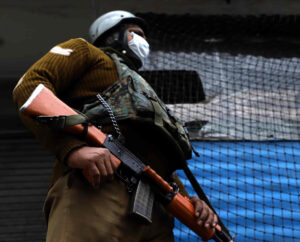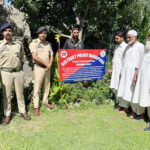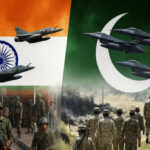 Qazi Mizan: On November 20, 2022, Indian police raided the homes of several journalists in Indian Kashmir in an investigation into anonymous online threats to about a dozen journalists. Indian police in propaganda has accused Pakistan without any investigation.
Qazi Mizan: On November 20, 2022, Indian police raided the homes of several journalists in Indian Kashmir in an investigation into anonymous online threats to about a dozen journalists. Indian police in propaganda has accused Pakistan without any investigation.
Indian security agencies and government-sponsored media have launched a planned and coordinated media campaign to drag Pakistan into this, tarnishing Pakistan’s image internationally through false accusations.
In Kashmir, the Indian LEA arrested more than six journalists without charge for questioning during a raid on a local journalist, confiscating their laptops, cameras and cell phones.
Indian police also raided the home of a lawyer who has been representing defendants in anti-militancy cases. Many Kashmiri journalists refused to report fabricated stories on Kashmir and Instead of toeing the Modi government’s line to push the Hindutva agenda in the region; he chose to resign from several English newspapers.
Apart from preventing them from reporting the actual situation on the ground, military violence and atrocities, the newspaper owners were also forcing these journalists to create a fictional anti-Kashmir and pro-India, mostly BJP-RSS narrative, news were Rising Kashmir and several other newspapers from Srinagar and Jammu are run and funded by the Indian Army and Ministry of Home Affairs to push the anti-Kashmir agenda. Journalists like Jahangir Sufi, Ishtiaq Jo, Shahrar Bukhari and Yaqub Ali who were working with the English daily Rising Kashmir for the past several years have left the newspaper.
Similarly, in August 2016, Kashmiri journalist Naseer Ahmed resigned from an Indian news channel saying that the channel had asked him to file fake news against Kashmir. is forcing There is a lack of voices to speak out on the targeting of journalists. Journalist associations in the valley have been suppressed by Indian authorities.
The Kashmir Press Club has been shut down. It is feared that those who have been targeted are silently accepting it as futile. Journalists are often threatened in Kashmir. Death threats, intimidation, assault, arrest and censorship have been part of the life of a typical local journalist.
Since 2019, when Kashmir’s special status was revoked, several journalists have been jailed and called in by the police for questioning. Many have been put on the no-fly list and not allowed to travel abroad. Recently, a Pulitzer-winning Kashmiri journalist was barred from going to New York to collect the prize.
India by criminalizing journalism in Kashmir Journalist associations in the Valley have disappeared. The Kashmir Press Club has been shut down. It is feared that those who have been targeted are silently accepting it as futile.
Journalists are often threatened in Kashmir. Death threats, intimidation, assault, arrest and censorship have been part of the life of a typical local journalist. Since 2019, when Kashmir’s special status was revoked, several journalists have been jailed and called in by the police for questioning.
Many have been put on the no-fly list and not allowed to travel abroad. Recently, a Pulitzer-winning Kashmiri journalist was barred from going to New York to collect the prize. India by criminalizing journalism in Kashmir Journalist associations in the Valley have disappeared.
The Kashmir Press Club has been shut down. It is feared that those who have been targeted are silently accepting it as futile. Journalists are often threatened in Kashmir.
Death threats, intimidation, assault, arrest and censorship have been part of the life of a typical local journalist. Since 2019, when Kashmir’s special status was revoked, several journalists have been jailed and called in by the police for questioning.
Many have been put on the no-fly list and not allowed to travel abroad. Recently, a Pulitzer-winning Kashmiri journalist was barred from going to New York to collect the prize. India by criminalizing journalism in Kashmir Threats have been made.
Death threats, intimidation, assault, arrest and censorship have been part of the life of a typical local journalist. Since 2019, when Kashmir’s special status was revoked, several journalists have been jailed and called in by the police for questioning.
Many have been put on the no-fly list and not allowed to travel abroad. Recently, a Pulitzer-winning Kashmiri journalist was barred from going to New York to collect the prize. India by criminalizing journalism in Kashmir Threats have been made.
Death threats, intimidation, assault, arrest and censorship have been part of the life of a typical local journalist. Since 2019, when Kashmir’s special status was revoked, several journalists have been jailed and called in by the police for questioning. Many have been put on the no-fly list and not allowed to travel abroad.
Recently, a Pulitzer-winning Kashmiri journalist was barred from going to New York to collect the prize. India by criminalizing journalism in Kashmir I, the Pulitzer-winning Kashmiri journalist was barred from going to New York to collect the award.
India by criminalizing journalism in Kashmir, the Pulitzer-winning Kashmiri journalist was barred from going to New York to collect the award. India by criminalizing journalism in KashmirIIOJK wants to hide the ground realities from the world and the international community should come forward to protect the free media in the occupied territory. India should also be pressured to allow the media to operate freely in the region.





